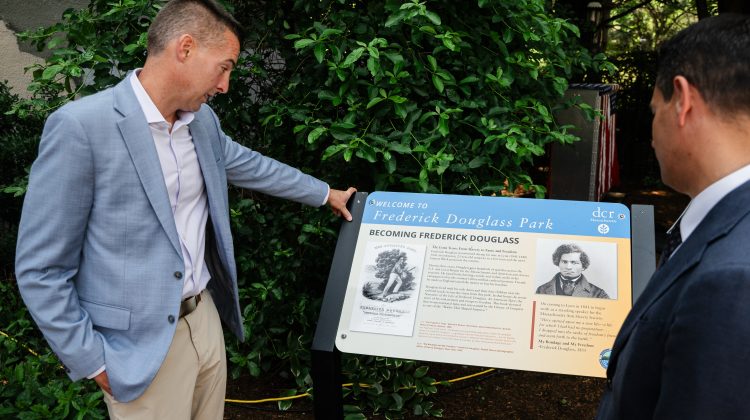LYNN – This year’s Frederick Douglass reading, hosted by the North Shore Juneteenth Association and sponsored by Mass Humanities, unveiled the new Frederick Douglass wayfinding sign for the park during the program.
Mayor Jared C. Nicholson said Lynn is “fortunate that we have this tradition already … to hear Frederick Douglass’ words ‘What to the Slave is the Fourth of July?’”
“I think it should remind us to think about what reflection we should offer in moments where our compatriots are celebrating when we know there are issues that we are confronting as a community and as a nation,” he said. “In the 1840s, when Frederick Douglass was here, it was the policy of the United States to allow for people to be enslaved.
“Shortly after Frederick Douglass concluded his time here in the year 1850, Congress passed legislation authorizing people under the force of federal law to come to the north, to Lynn if they wanted, to forcefully capture people against the will of the local community. People spoke out and stood up against that overreach, that injustice, and here in the city of Lynn, we had one of the foremost leaders in that movement, in the abolition movement, in Frederick Douglass doing that right here on these streets.”
Nicholson concluded by saying, “That should continue to serve as an inspiration to all of us.”
Tom Dalton, who is the author of “Frederick Douglass: The Lynn Years,” called the park “sacred ground” and coined Douglass “one of the great orators of the century.”
“He wrote an American masterpiece,” Dalton said, “That book (‘Narrative of the Life of Frederick Douglass, An American Slave’) is so incredible, and the book was a great act of courage.”
Nicole McClain, president and founder of the North Shore Juneteenth Association and Lynn councilor at large, said she wanted to “reflect on the powerful legacy of Frederick Douglas, his courage, his voice and why his words – especially his speech ‘What to the Slave is the Fourth of July?’ – still matter so deeply.
“After his escape, Frederick Douglass settled in Lynn, Massachusetts, right here in our community. It was in Lynn that he began to speak out boldly against slavery, where he faced hostility and even physical violence for daring to speak the truth – but he never backed down,” McClain said. “Lynn helped shape him into the fierce abolitionist and orator we remember today.
“In 1852, Douglass delivered one of the most important speeches, which we will be reciting today, ‘What to the Slave is the Fourth of July?’ Standing before a crowd in Rochester, New York, he asked a haunting question: How can a nation celebrate freedom while millions remain in bondage?
“He said, ‘This Fourth of July is yours, not mine,’ and yet he did not reject the ideals of liberty and justice. He believed in them deeply, and he challenged America to live up to them for everyone, just as we are challenging America to do that today.”
Kendra Amaral, the Department of Conservation and Recreation deputy commissioner for policy and public affairs, explained the significance of the new wayfinding sign.
“The new panel that we will just see in a few minutes shares the story of Frederick Douglass’ transformation during his time here in Lynn. He coincidentally lived across the street, which Wendy (Joseph) showed me, right over there, so it’s wonderful to have this channel right within sight of one of the places that he lived,” Amaral said.
Amaral continued, “He worked as an abolitionist, significantly impacted our fight for rights for people of color in our nation, and it is important to mark this. We are proud to maintain this park as a space for visitors to enjoy and to celebrate and learn about his story in history and the important role that he played in our nation’s history.”
Following the speaking program, the new wayfinding sign was revealed. The sign’s design and text were the result of a multiyear collaboration among Barbara Buls of the DCR, Dalton, Lynn Museum Executive Director Doneeca Thurston-Chaves and Wendy Joseph, Curator of the Grant Army of the Republic Hall and Museum.
“Frederick Douglass remains a true inspiration, and we hope this park and panel serves to remind us all of our history and encourage us to press forward today and into the future,” Amaral said.

